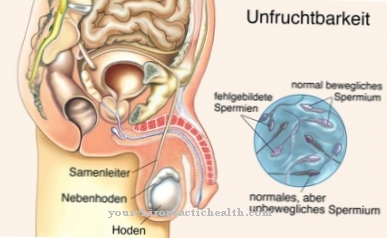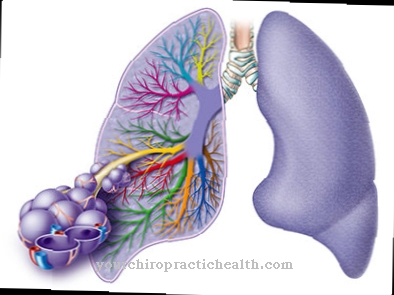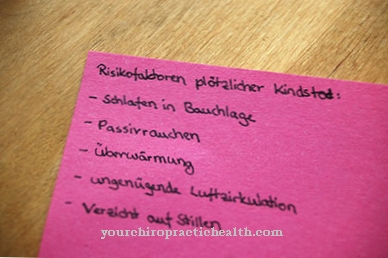A Inflammation of the gums (gingivitis) is a bacterially inflamed dental disease of the oral cavity. The cause of this inflammation is usually poor oral hygiene. Typical complaints are bleeding gums, toothache and swelling of the gums. In the course of an untreated gingivitis, the gums slowly recede from the tooth necks, which can lead to the failure of the teeth. Timely treatment at the dentist is therefore advisable.
What is gingivitis?

With a Inflammation of the gums (gingivitis) is not to be joked; It is an inflammation of the gums caused by bacteria in the oral cavity, which, if left untreated, can quickly turn into periodontitis and thus injure or even destroy the tooth support system forever.
Gingivitis is the redness or swelling of the gums that is inflamed by plaque in the mouth. The gums bleed very quickly when touched, but gingivitis is usually not painful. If gingivitis becomes chronic, it can turn into periodontitis and lead to tooth loosening and bone loss.
causes
A Inflammation of the gums mostly results from poor oral hygiene. It is caused by bacterial plaque that adheres to the teeth and gum lines.
This plaque, which can turn into tartar after a while, releases bacterial products from metabolic and decay processes that stimulate the body's own defenses. The immune system tries to fight the bacteria. So enzymes are formed that are supposed to act against the pathogens, but these enzymes also destroy the patient's own tissue, which leads to connective tissue and bone loss.
This is how it comes to bleeding gums: gum pockets form which trap bacteria, the gums recede and the teeth loosen in their holding apparatus.
There are also a number of risk factors that make gingivitis more likely to develop. Such factors are for example: diabetes, pregnancy, leukemia or certain medications for high blood pressure or epilepsy. Deficiency symptoms such as vitamin C deficiency, malnutrition or too little saliva (dry oral cavity) can also trigger gum inflammation. Anabolic steroids, narrow tooth spacing, tooth decay and smoking do not have a positive effect on oral hygiene and are also risk factors.
Symptoms, ailments & signs
Inflammation of the gums brings with it the classic symptoms that characterize acute inflammation. First of all, there is the reddening: while healthy gums are pale in color, inflamed gums can often be easily recognized by laypeople by their bright red appearance. In addition, there is a swelling, which often cannot be overlooked.
Often a bulge can be seen on the gum line. This is characteristic because the bacteria that trigger the gingivitis can often settle here particularly well. Swelling and reddening of the gums are typical in areas where tartar can also be found.
Furthermore, a throbbing pain is typical for an inflammatory reaction on the gums. In addition, there is a tendency to bleed: Inflamed gums often start to bleed when they come into contact with a toothbrush during normal cleaning hygiene. Gum inflammation is also characterized by a putrid smell and an unpleasant taste in the mouth.
These come from the decomposition processes triggered by the bacteria in the mouth. The late symptoms of gingivitis are particularly serious. The inflammation creates a space between the tooth and the gum that encourages the colonization of bacteria. The root area can also be attacked. All of this leads to the tooth being loosened in its tooth bed and even falling out as a long-term consequence of the gingivitis.
Course of disease
If left untreated, a Inflammation of the gums become chronic after just a few days. The gums are attacked very quickly and irreparably damaged. Loosening of the teeth can endanger the dentition.
If the gums are attacked due to mechanical irritation, the inflammation will heal again after a few days without any major difficulties. The situation is different with bacterial irritation.
Such an inflammation can drag on for years, since it is initially painless if it is not even noticed.
Plaque and tartar inflame the gums, which slowly recede and the bacteria have free access to the necks of the teeth. Only after years do pain or tooth loosening occur in this lengthy process. Therefore, good dental prophylaxis is essential.
Complications
If gingivitis is left untreated, the inflammation can spread to the surrounding tissue. Deposits form in gum pockets, which represent an ideal breeding ground for bacteria: These penetrate further and further into the jawbone and damage connective tissue and bone substance. The gums recede, the tooth necks are exposed and offer the bacteria space for further destruction.
As a result, the teeth lose their anchorage in the jawbone and fall out. The complications of gingivitis are not limited to the oral cavity, but can affect the entire organism. Bacteria travel through the bloodstream to various organs and can, for example, cause inflammation of the inner lining of the heart (endocarditis) or damage the kidneys.
The immune system is weakened, and the risk of suffering a stroke or heart attack increases. Pre-existing diabetes (diabetes mellitus) can be negatively affected by gingivitis. Rheumatic diseases can worsen, occasionally pathogens settle on artificial joints and trigger an inflammatory process.
Inflammation of the gums during pregnancy increases the risk of miscarriage, and growth disorders in the unborn also occur. Older people or people with weakened immune systems run the risk of bacteria from the oral cavity entering the lungs and causing pneumonia.
You can find your medication here
➔ Medicines against tartar and tooth discolorationWhen should you go to the doctor?
With inflammation of the gums, a doctor is not required in a large number of cases. Usually, the inflammation heals completely after a few days without further complications or sequelae. Medical care is not necessary in these situations, as the body's own immune system initiates the regeneration processes. If the symptoms are free within a few days, no further visit to the doctor is necessary. The consultation of a doctor is indicated if the gingivitis is progressing continuously and has an increasing intensity.
If redness in the mouth area increases, if there is swelling or a purulent taste in the mouth, a doctor should be consulted. In the case of loss of appetite, pain while eating, internal restlessness or irritability, clarification of the cause is indicated. If teeth loosen and irregularities occur in existing dentures or braces, an examination should be initiated. If redness appears in the mouth area over several days or weeks, it is also advisable to consult a doctor.
If the body temperature rises, headaches, tiredness or persistent malaise, the person concerned should consult a doctor. Help and support is also needed if canker sores form in the mouth or if the state of health deteriorates significantly within a short period of time.
Treatment & prevention
For the prevention and treatment of Inflammation of the gums Regular visits to the dentist and good oral hygiene (brushing, flossing or interdental brushing two to three times a day, using a supportive mouth rinse every now and then) are the easiest and most effective things that can be done to prevent gum inflammation.
A thorough dental cleaning may also be advisable once or twice a year in order to be able to remove all plaque as completely as possible.
If the dentist has diagnosed gingivitis or even periodontitis, plaque and tartar must be removed so that the inflammation can improve. After a comprehensive diagnosis using an X-ray image and analysis of the progression of the disease, the next step is cleaning, which is characterized by mechanical cleaning by the dentist, renewal of fillings, any tooth tension and rinsing fluids. The patient also receives tips on how good dental care should look.
Aftercare
Inflammation of the gums can often be traced back to poor oral hygiene. If food remains in the oral cavity as a result, bacteria can multiply rapidly and trigger the painful inflammation. Thorough and regular dental care should therefore be part of daily personal hygiene. However, it is also important not to brush your teeth too vigorously in order to prevent injuries, which can also trigger inflammation of the gums.
A strong immune system is necessary to prevent pathogens from spreading. A balanced diet, adequate exercise and avoidance of obesity all contribute to strengthening the body's defenses. Restful sleep and stress-free rest phases also promote the health of the organism. With inflammation of the gums, the patient must pay particular attention to the composition of his food.
Spicy, acidic foods, as well as alcohol and nicotine, should be avoided as they can aggravate the discomfort in the mouth area. The inflamed areas in the mouth should be spared when chewing. In spite of the complaints, however, thorough teeth cleaning should never be avoided so that bacteria cannot multiply. Toothbrushes with soft bristles and medical mouthwashes help those affected to curb the spread of the germs and gradually minimize the symptoms.
You can do that yourself
In the event of inflammation, the body's own defense system must be supported. In order to prevent the pathogens from spreading as quickly as possible or to kill them, the organism needs a stable and healthy immune system. This is influenced by the daily diet and the behavior of the person concerned. A healthy and balanced food intake, avoidance of obesity, regular oxygen supply and adequate exercise promote the general health of the organism. Care should also be taken to ensure sufficient rest and a restful sleep.
In order not to aggravate the discomfort in the mouth and throat, the components of the food must be checked. Spicy foods, acidic products or harmful substances such as alcohol and nicotine should not be consumed as they can lead to an increase in existing complaints. The chewing process should be shifted to the areas in the mouth that are not affected by the inflammation, if possible.
Daily teeth cleaning is to be carried out despite existing complaints. Otherwise the germs can multiply faster and further weaken the general state of health. However, the cleaning should be changed so as not to cause further damage to the gums. Otherwise, the bristles of a toothbrush can damage the mucous membranes and further. Mouthwashes and cleaning the spaces between the teeth can curb the spread of germs and thereby alleviate existing symptoms.





.jpg)


















.jpg)



